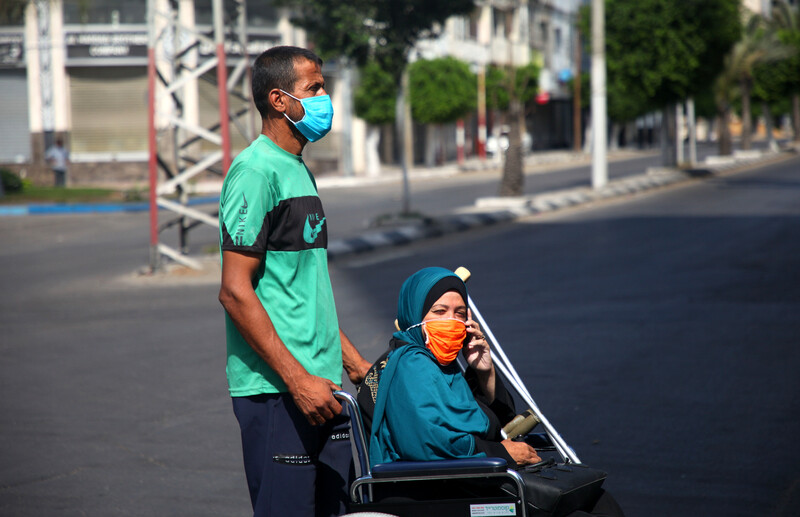Rights and Accountability 28 August 2020

The first cases of COVID-19 outside quarantine centers have been confirmed in Gaza.
APA imagesThe Gaza Strip is at breaking point.
Medical experts and human rights groups have repeatedly warned in recent months that Gaza’s health care system would not be able to cope with an outbreak of COVID-19.
What was feared is now happening.
The first cases of COVID-19 were discovered outside of quarantine facilities and among the general public in Gaza earlier this week.
Since the outbreak, more than 100 cases of COVID-19 have been recorded in the community, and two people have died in two days as a result of the illness, according to Gaza’s health ministry.
Hamas, the resistance organization running Gaza’s internal affairs, has imposed a 72-hour lockdown to be lifted on Sunday.
Residents are barred from traveling between districts and all businesses were ordered closed, bar essential services such as bakeries and water distribution centers.
Schools, mosques and public facilities have also been shuttered.
The total number of confirmed cases of COVID-19 in Gaza has topped 200, with three deaths, including 37 new cases in quarantine facilities.
Gaza’s warden
The Kerem Shalom checkpoint, the only place Israel allows commercial goods in and out of Gaza, has reopened after Israel imposed a closure for almost two weeks for all but “vital humanitarian aid.”
However, despite the state of emergency in Gaza, Israel continues to forbid donor-funded fuel from entering the territory.
This has caused Gaza’s only power plant to shut down since 18 August.
Palestinians in Gaza have been surviving on no more than six hours of non-consecutive electricity per day.
The International Committee of the Red Cross said Gaza now faces a “double crisis” – severe electricity shortages as well as a coronavirus outbreak.
Severe electricity shortages jeopardize hospitals, quarantine centers and waste disposal and water desalination and distribution services, the Israeli human rights group Gisha has warned.
“The Gaza health care system would not be able to deal with more than a few dozen coronavirus patients,” Ignacio Casares Garcia, head of the Red Cross office in Gaza, stated.
Gaza lacks sufficient medical equipment and supplies for the treatment of COVID-19 patients, he added.
Gaza’s health ministry has had a severe shortage of coronavirus testing kits since cases were first discovered in March, and about half of essential drugs in Gaza are running out.
Gaza’s medical system, weakened due to successive Israeli military assaults on the territory and a 13-year-old siege, is unable to provide adequate care for regular patients, especially those diagnosed with cancer.
The Palestinian Center for Human Rights (PCHR) said that Gaza is witnessing “a new and unprecedented phase that will affect all aspects of life and aggravate the already critical humanitarian conditions.”
With sewage treatment out of commission due to electricity cuts, raw sewage may be dumped into the Mediterranean Sea in the coming days, PCHR also warned.
Under “normal” circumstances, this would harm Gaza’s fishers, whom the Israeli military restrict to an area of several nautical miles from the shore.
But Israel has completely barred fishers in the coastal enclave from sailing off the coast since 16 August.
Gaza’s fishing industry is vital to its economy with tens of thousands of families dependent on it for food and income.
Israel hasn’t allowed construction materials into Gaza since 11 August either.
Who is Israel punishing?
Israel claims that cutting fuel supplies and closing the coast are punitive measures in response to incendiary balloons launched from Gaza into southern Israel.
Palestinians launch incendiary balloons as a symbolic act of protest against an Israeli occupation that has turned Gaza into an almost unlivable place.
Israel has responded by dropping highly destructive missiles from F-16s onto the densely populated territory.
But who is Israel punishing?
There are two million Palestinians in Gaza, half of them children.
Most families in the territory are to some extent food insecure and 86 percent of young children do not have a sufficient diet.
Gaza’s unemployment rate stands at about 46 percent, among the highest in the world. That proportion is even higher among young people.
More than half of Gaza’s population lives in poverty, according to data from the Palestinian Central Bureau of Statistics.
Human rights groups have called on Israel to reverse measures of collective punishment, which is a violation of article 33 of the Fourth Geneva Convention, and thus a war crime.
Israel’s obligation
The UN’s Middle East peace envoy, Nickolay Mladenov, was quick to condemn “militants” for launching “projectiles and incendiary devices” into southern Israel, implying that was the root cause of the current deterioration in Gaza.
Mladenov raised alarms over the failing health care system, lack of electricity and soaring unemployment, while conveniently shielding Israel from accountability in perpetrating the present crisis. While the UN envoy called on Israel to allow fuel to enter the territory, he did not urge that it halts the bombing of Gaza, opens the coastal waters or lifts the devastating siege. Most notably, Mladenov fails to hold Israel accountable for its legal obligation as the occupying power to guarantee basic services and health infrastructure to Palestinians.This includes Palestinians in the occupied West Bank, including East Jerusalem, and Palestinian political prisoners that Israel continues to detain despite multiple outbreaks in its jails.
By failing to guarantee Palestinians the right to health and actively hampering the exercise of that right, Israel violates article 56 of the Fourth Geneva Convention.
Israel has already caused a humanitarian disaster in Gaza. COVID-19 risks making that disaster much worse.





Comments
"sever electrical shortages"
Permalink Mira replied on
"sever electrical shortages" .. mean no means of refrigerating food.
I don't need to tell anyone that perishable food kept / left at room temperature goes into a
DANGER ZONE all of its own.
And the consequences there are very serious.